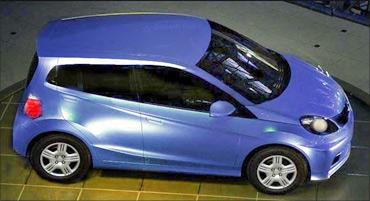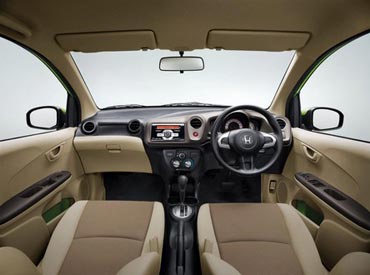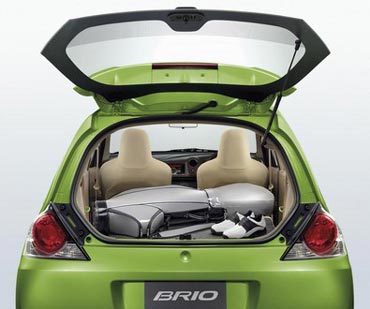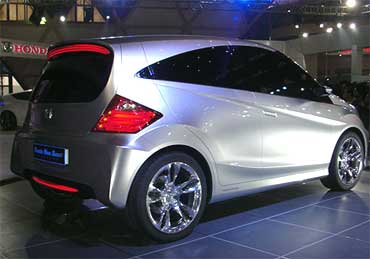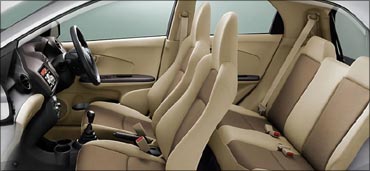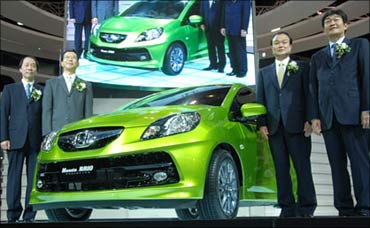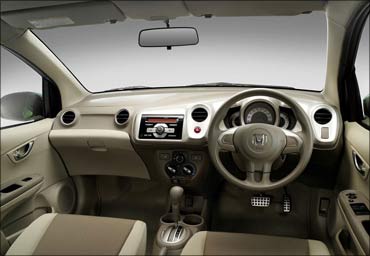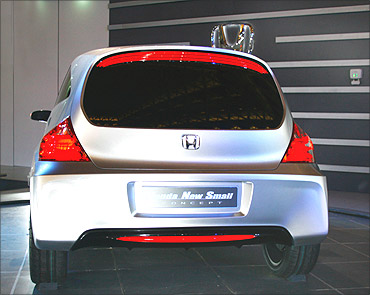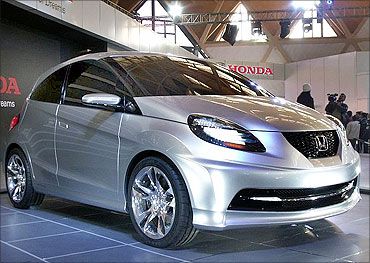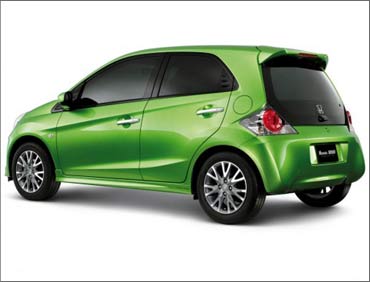 | « Back to article | Print this article |
Honda Brio launched @ Rs 395,000!
Japanese car major Honda on Tuesday announced its foray into the highly competitive low-price compact car segment in India with the launch of its Brio model, priced between Rs 3.95 lakh (Rs 395,000) and Rs 5.1 lakh (Rs 510,000), ex-showroom, Delhi.
The company, which is present in India through a joint venture with the Siel group, Honda Siel Cars India, said it is also targeting revenues of Rs 112 crore (Rs 1.12 billion) this fiscal from the export of auto components from India.
"With Brio, we will be entering a new segment for the first time in India. It has been designed and developed specially to meet the needs of customers here," HSCI president and CEO Takashi Nagai said in New Delhi.
He said the company had promised to price it less than Rs 5 lakh (Rs 500,000) and has been able to do this through cost-efficiency measures and high localisation of components. However, the top-end variant of the vehicle will cost Rs 5.1 lakh.
Click NEXT to read on . . .
Honda Brio launched @ Rs 395,000!
"The Brio is at present about 80 per cent localised and over the next few months, it will reach 90 per cent," he said, adding, "this has been key to the pricing strategy of the Brio."
The Brio will compete with the likes of the Hyundai i10, Maruti WagonR and General Motors Chevrolet Beat, which are priced in a similar range.
The Brio will be available in four variants. Nagai said the company expects a large chunk of the customers for the Brio to come from smaller cities, whereas demand in bigger cities is likely to be for existing models such as the City, Civic and Accord.
"The compact car segment will soon become the second pillar of business for Honda in India," Nagai said.
Click NEXT to read on . . .
Honda Brio launched @ Rs 395,000!
Commenting on the development of the car, which is powered by a 1.2-litre petrol engine, he said HSCI's engineers have been involved in the project right from the drawing stage.
On exports of components, Nagai said HSCI has already started shipping components of the Brio to Thailand from its facility at Rajasthan.
"We will have export turnover of Rs 112 crore this fiscal," he said. The company also exports components for the City and Jazz to Malaysia and Indonesia.
The Brio review
The last while has not been a good time to be a Honda employee. The Japanese behemoth, which once could do no wrong in India, has found itself beleaguered by all manner of crises.
Some, like the recent tsunami in Japan, have been beyond its control, but others have been situations where a bit of timely action could have staved off significant headaches.
Click NEXT to read on . . .
Honda Brio launched @ Rs 395,000!
To not have a diesel offering in its stable, in a country where petrol prices have blown the roof off, is puzzling, to say the least.
The other area where Honda has displayed a lack of foresight is in the small car arena; it may have given us the Jazz, but its price ensured that only die-hard Honda fans reached for their chequebooks.
All slumps have an absolute bottom point, however, and Honda appears to have reached its -- the only way now seems to be up.
Its diesel engine plans have been put into operation, the Jazz is now available at a mouth-watering price and, perhaps most significant in the present moment, it now has a genuine 'small' car in their product portfolio -- the Brio, meaning 'liveliness, vigour and vivacity'. So does it live up to its name? Let's find out.
Click NEXT to read on . . .
Honda Brio launched @ Rs 395,000!
Stand in front of the Brio and you'll see the Jazz's DNA in evidence in the way that the bonnet is shaped and the headlamps flow back towards the body.
The design team adopted what they call a 'Double Triangle' form for the car, with the 'dynamic' triangle focussed on the nose section, sweeping forward, and the 'sporty' triangle focussed on the rear bumpers.
The Brio is an entertaining mix of the sporty and the quirky; when seen from the front three-quarter, especially with the alloy wheels and fog lamps of the 'V' version, the car could well be a souped-up hot hatch.
In profile, the lines flow smoothly backward, giving the car a sense of purpose; the rear end is a little at odds with the rest of the package (the 'quirky' bit), with the sharply angular, flat hatch looking somewhat old school, and the protruding tail lamps coming off as a bit ungainly.
Click NEXT to read on . . .
Honda Brio launched @ Rs 395,000!
Thought has gone into the rear, however -- the reinforced glass hatch is light and affords excellent rear visibility for the driver, and the hatch space itself is enough for a couple of suitcases and, with the rear seats folded down, two golf bags.
It also shows you one area where costs have been cut -- there's only one hydraulic support-strut for the hatch, rather than two. All-in, this is a fresh-looking car with presence, one that turns heads, and for that Honda deserves kudos.
The Brio's cabin continues with the 'sporty, practical and quirky' theme.
Space utilisation is of a high order, with an airy, light-filled atmosphere inside, and impressive leg room for rear passengers; three people in the back, however, will be a bit of a squeeze.
Click NEXT to read on . . .
Honda Brio launched @ Rs 395,000!
The seats are comfortable, although some more under-thigh support would have been welcome, as well as better neck-support at the rear -- for a person of my height (5'11"), the head rest at the back was too low to be of real use.
The driver's seat could have done with a height-adjustment feature as well. The materials used, in terms of plastics, fabric and so on, are of high quality, although the brown plastic panel on the dashboard looks a little tacky.
The dash is very well laid out, with a three-dial display, and controls fall easily to hand. You'll see parts sharing with other Honda cars, in the form of the power window buttons (the ones at the back are of the rocker-switch type), the gear lever, the stereo system and so on.
USB, AUX-IN (no CD) and steering-mounted audio controls are standard, as are a full complement of safety features -- ABS with EBD and twin front airbags.
Click NEXT to read on . . .
Honda Brio launched @ Rs 395,000!
The rear passengers will find entry and exit quite easy, with the central pillar having been moved further forward, and overall NVH levels are very good, with the slightly buzzy engine note coming through only on hard acceleration.
The heart of the Brio's story is the same 1.2-litre petrol engine found in the Jazz, here producing 87 bhp and 11.1 kgm of torque.
Mated to a 5-speed manual transmission, the engine displays typical Honda characteristics -- it's refined, peppy and sounds like it'll go on forever.
Click NEXT to read on . . .
Honda Brio launched @ Rs 395,000!
The engine has been tuned primarily for city conditions and, along with the slick gearbox, it makes driving the Brio an absolute breeze; this is a real no-effort car.
Rev the engine harder and the Brio displays a cheerful nature, nipping off the line and being eager to be pushed, its light body helping things along.
The suspension, however, struggles a little to keep up -- the MacPherson strut front and H-torsion beam rear have been set up more for comfort than handling.
Click NEXT to read on . . .
Honda Brio launched @ Rs 395,000!
As a result, although the ride quality is agreeably plush, the car wallows a little too much during spirited driving, and also exhibits a degree of roll, with the suspension taking a while to settle even after the bump or undulation has been left behind.
This is not likely to be a problem in everyday city driving, however.
So, does the Brio live up to the hype, in the end? After this first-drive, I would have to answer in the affirmative.
Click NEXT to read on . . .
Honda Brio launched @ Rs 395,000!
It is light, compact-yet-roomy, quite practical, distinctive-looking, refined and fun to drive, making for a near-perfect urban car -- it certainly lives up to its moniker.
With Honda promising to keep the car's starting price under Rs 5 lakh (Rs 500,000), the Brio seems like it's set to bring about a change in the company's fortunes, and I'm sure that the competition is starting to shift uneasily in their seats. Let the games begin!
